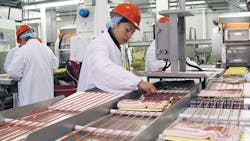Anybody Need a Management Consultant Right Now? Thought Not
Funny how a pandemic can seem to turn things upside down. A few weeks ago, society prized most highly the work of those who get paid the most, while esteeming far less the labor of those in menial roles with low wages. Ethically, that may have been wrong all along. But only now does it seem perverse.
Think for a moment about the jobs or functions that matter most as the coronavirus shuts down ever more parts of our economies, threatening to break supply chains for food, medicine and other essentials. Is it the management consultant who excels at her Powerpoint presentations? Or the mergers-and-acquisitions lawyer who makes money when his client buys a company, then again when the client divests the same business later?
Don’t get me wrong: These really are “good” jobs, not only because they pay well but also because they’re necessary in many other economic and social ways. But in exceptional times, such as the present, they’re utterly dispensable. Nobody will starve, die or suffer in the coming months if the world’s white-collar elite works temporarily from home, or suspends work altogether.
That can’t be said for an awful lot of other jobs that only a few weeks ago seemed peripheral, and are thus underpaid and undervalued. Many of us are silently and solemnly impressed by the stoic work ethic of our local supermarket cashiers. Shielded, if that is word, only by the flimsiest of plastic contraptions, they keep scanning our vittles, occasionally adding a dose of humor to keep up their spirits. And ours.
Out of sight in the back, other workers are unloading trucks and shelving goods. Waiting behind them are the drivers of those trucks, probably sleep deprived after long hauls across partially shuttered border crossings.
On it goes, until the supply chain reaches women and men in the fields, picking the fruit and vegetables we take for granted. I once joined some of them, plucking grapes in California’s Central Valley, to hear their stories. Even in normal times, many of them teeter on the edge of subsistence. Invisible to the middle classes — especially if they’re also illegal aliens, as many are — they fear every day for their loved ones as some of us only do now that we’re in a pandemic.
Then there are the medical workers, from the ambulance drivers to the doctors and the nurses. Their stations in 2020 are the front line of what many political leaders describe as a war. At least some of them, the doctors, have always been compensated in both money and respect. That’s less true of the many nurses, who often make a pittance.
Only one line removed, there’s the staff in retirement communities, nursing homes and palliative care. They tend to those in greatest danger, the elderly for whom every human interaction is a potential vector and could decide life or death.
Division of Labor
For Homo sapiens, our division of labor is part of what makes us fully human, and so successful as a species. One theory why Cro Magnon prevailed over the Neanderthals is that our ancestors specialized, with the men doing the hunting and the child-bearing women the gathering, whereas the Neanderthals didn’t.
Many of our greatest thinkers took this idea further, especially the liberal philosophers. Adam Smith understood that if we specialize according to our absolute advantage — A is better at giving Powerpoint presentations, B is better at picking fruit — and then share, we all end up better off than we would otherwise be. David Ricardo grasped that this remains true even when A, for example, is better than B at every task, as long as they specialize according to their relative advantage.
And yet, the more sophisticated the division of labor became, the queasier some people felt about it. Karl Marx, in the era of Manchester capitalism exemplified by the English city’s textile factories, felt that it reduced workers to the status of machines, leaving them alienated and depressed. Henry David Thoreau, writing at about the same time but in a very different woodland setting, thought it disconnected humans from both nature and one another.
And they’re all right. We can’t and won’t give up the division of labor, for that would impoverish us. That’s as true of the global economy as it is of a national one, and applies to every company, organization and household. But we must comprehend these invisible chains as parts of a whole, and ensure that each link, each person, is treated with fairness and dignity.
The pandemic of 2020 reminds us of several things. First, that we’re in our essence offline and analog creatures, not online and digital ones. We cannot bite into bytes, eat algorithms or disinfect with bandwidth. Somebody has to grow, harvest and deliver our food, somebody has to care for the sick. If these people quit or die, we’re all vulnerable.
The virus also reminds us that even though we divide our tasks for efficiency, we are all ultimately equal. SARS-CoV-2 infects upper, middle and lower classes alike; it doesn’t ask for college degrees, tax brackets, passports or migrant papers. Why, then, do NBA players and Oscar winners get to skip the line for virus tests, while the garbage collectors who remove our medical waste go last?
To survive the pandemic, we rely on everybody to show up for duty. So as governments and employers prepare their bailouts, they should acknowledge who bears what burden and what risk, and compensate them with respect and money, during the crisis and after. And we — as voters, consumers, patients and workers — should do our part.
For the ultimate lesson of Covid-19 is this: We’re all connected.
